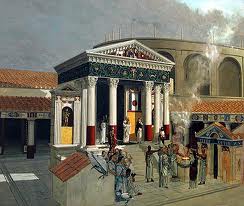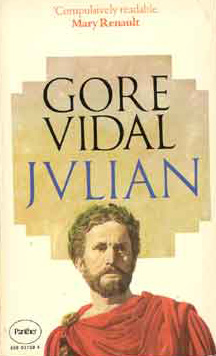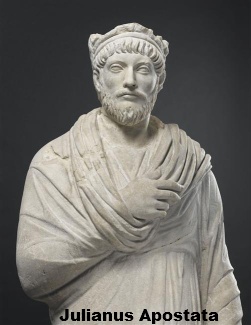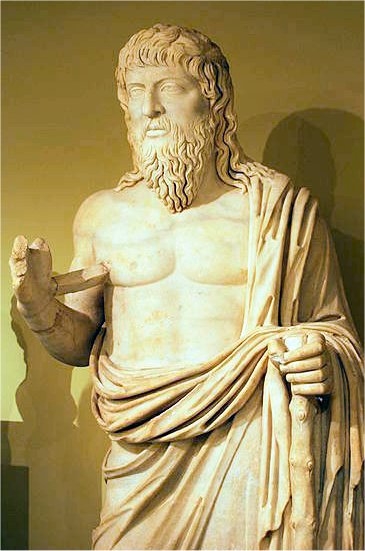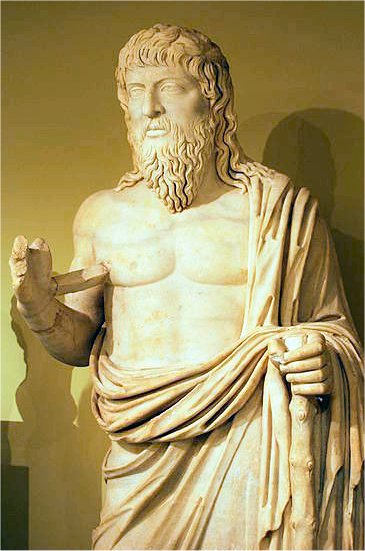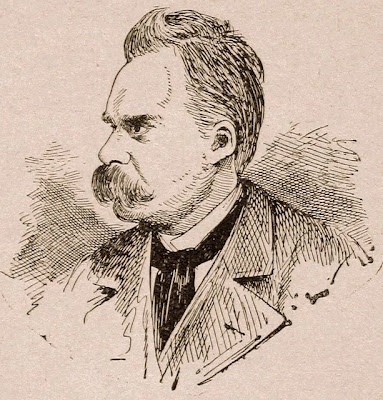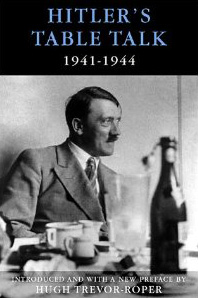From David Irving’s web page:
The Table Talks’ content [originally written in shorthand] is more important in my view than Hitler’s Mein Kampf, and possibly even more than his Zweites Buch (1928). It is unadulterated Hitler. He expatiates on virtually every subject under the sun, while his generals and private staff sit patiently and listen, or pretend to listen, to the monologues.
The first excerpt is taken from what Hitler said in a night of July of 1941 (ellipsis omitted between unquoted passages):

Hitler’s Table Talk, 1941-1944
His Private Conversations
Part I
1941
When National Socialism has ruled long enough, it will no longer be possible to conceive of a form of life different from ours. In the long run, National Socialism and religion will no longer be able to exist together.
(On a question from C. S., whether this antagonism might mean a war, the Führer continued:)
No, it does not mean a war. The ideal solution would be to leave the religions to devour themselves, without persecutions. But in that case we must not replace the Church by something equivalent. That would be terrifying! It goes without saying that the whole thing needs a lot of thought. Everything will occur in due time. It is a simple question of honesty, that’s what it will finally boil down to.
The German people’s especial quality is patience; and it’s the only one of the peoples capable of undertaking a revolution in this sphere. It could do it, if only for the reason that only the German people have made moral law the governing principle of action.
The heaviest blow that ever struck humanity was the coming of Christianity. Bolshevism is Christianity’s illegitimate child. Both are inventions of the Jew. The deliberate lie in the matter of religion was introduced into the world by Christianity. Bolshevism practises a lie of the same nature, when it claims to bring liberty to men, whereas in reality it seeks only to enslave them. In the ancient world, the relations between men and gods were founded on an instinctive respect. It was a world enlightened by the idea of tolerance. Christianity was the first creed in the world to exterminate its adversaries in the name of love. Its key-note is intolerance.
Without Christianity, we should not have had Islam. The Roman Empire, under Germanic influence, would have developed in the direction of world-domination, and humanity would not have extinguished fifteen centuries of civilisation at a single stroke.
Let it not be said that Christianity brought man the life of the soul, for that evolution was in the natural order of things. The result of the collapse of the Roman Empire was a night that lasted for centuries.
The Romans had no dislike of the Germans. This is shown by the mere fact that blond hair was fashionable with them. Amongst the Goths there were many men with dark hair.
23rd September 1941, evening
To make death easier for people, the Church holds out to them the bait of a better world. We, for our part, confine ourselves to asking man to fashion his life worthily. For this, it is sufficient for him to conform to the laws of nature. Let’s seek inspiration in these principles, and in the long run we’ll triumph over religion.
10th October 1941, midday
Christianity is a rebellion against natural law, a protest against nature. Taken to its logical extreme, Christianity would mean the systematic cultivation of the human failure.
14th October 1941, midday
Special Guest: Reichsfuehrer Himmler
It may be asked whether concluding a concordat with the churches wouldn’t facilitate our exercise of power.
On this subject one may make the following remarks: Firstly, in this way the authority of the State would be vitiated by the fact of the intervention of a third power concerning which it is impossible to say how long it would remain reliable. In the case of the Anglican Church, this objection does not arise, for England knows she can depend on her Church. But what about the Catholic Church?
I’m convinced that any pact with the Church can offer only a provisional benefit, for sooner or later the scientific spirit will disclose the harmful character of such a compromise. Thus the State will have based its existence on a foundation that one day will collapse.
An educated man retains the sense of the mysteries of nature and bows before the unknowable. An uneducated man, on the other hand, runs the risk of going over to atheism (which is a return to the state of the animal) as soon as he perceives that the State, in sheer opportunism, is making use of false ideas in the matter of religion, whilst in other fields it bases everything on pure science.
That’s why I’ve always kept the Party aloof from religious questions. I’ve thus prevented my Catholic and Protestant supporters from forming groups against one another, and inadvertently knocking each other out with the Bible and the sprinkler. So we never became involved with these Churches’ forms of worship. And if that has momentarily made my task a little more difficult, at least I’ve never run the risk of carrying grist to my opponents’ mill. The help we would have provisionally obtained from a concordat would have quickly become a burden on us. In any case, the main thing is to be clever in this matter and not to look for a struggle where it can be avoided.
Being weighed down by a superstitious past, men are afraid of things that can’t, or can’t yet, be explained—that is to say, of the unknown. If anyone has needs of a metaphysical nature, I can’t satisfy them with the Party’s programme. Time will go by until the moment when science can answer all the questions.
So it’s not opportune to hurl ourselves now into a struggle with the Churches. The best thing is to let Christianity die a natural death. A slow death has something comforting about it. The dogma of Christianity gets worn away before the advances of science. Religion will have to make more and more concessions. Gradually the myths crumble.
Nobody has the right to deprive simple people of their childish certainties until they’ve acquired others that are more reasonable. Indeed, it’s most important that the higher belief should be well established in them before the lower belief has been removed. We must finally achieve this. But it would serve no purpose to replace an old belief by a new one that would merely fill the place left vacant by its predecessor.
♣
It seems to me that nothing would be more foolish than to re-establish the worship of Wotan. Our old mythology had ceased to be viable when Christianity implanted itself. Nothing dies unless it is moribund. At that period the ancient world was divided between the systems of philosophy and the worship of idols. It’s not desirable that the whole of humanity should be stultified—and the only way of getting rid of Christianity is to allow it to die little by little.
Science cannot lie, for it’s always striving, according to the momentary state of knowledge, to deduce what is true. When it makes a mistake, it does so in good faith. It’s Christianity that’s the liar. It’s in perpetual conflict with itself.
One may ask whether the disappearance of Christianity would entail the disappearance of belief in God. That’s not to be desired. The notion of divinity gives most men the opportunity to concretise the feeling they have of supernatural realities. Why should we destroy this wonderful power they have of incarnating the feeling for the divine that is within them?
I envisage the future, therefore, as follows: First of all, to each man his private creed. Superstition shall not lose its rights. We’ll see to it that the Churches cannot spread abroad teachings in conflict with the interests of the State. We shall continue to preach the doctrine of National Socialism, and the young will no longer be taught anything but the truth.
19th October 1941, night
The reason why the ancient world was so pure, light and serene was that it knew nothing of the two great scourges: the pox and Christianity.
Christianity is a prototype of Bolshevism: the mobilisation by the Jew of the masses of slaves with the object of undermining society. Thus one understands that the healthy elements of the Roman world were proof against this doctrine.
Yet Rome to-day allows itself to reproach Bolshevism with having destroyed the Christian churches. As if Christianity hadn’t behaved in the same way towards the pagan temples!
21st October 1941, midday
When one thinks of the opinions held concerning Christianity by our best minds a hundred, two hundred years ago, one is ashamed to realise how little we have since evolved. I didn’t know that Julian the Apostate had passed judgment with such clear-sightedness on Christianity and Christians. You should read what he says on the subject.
Originally, Christianity was merely an incarnation of Bolshevism the destroyer. Nevertheless, the Galilean, who later was called the Christ, intended something quite different. He must be regarded as a popular leader who took up his position against Jewry. Galilee was a colony where the Romans had probably installed Gallic legionaries, and it’s certain that Jesus was not a Jew. The Jews, by the way, regarded Him as the son of a whore—of a whore and a Roman soldier.
The decisive falsification of Jesus’ doctrine was the work of St. Paul. He gave himself to this work with subtlety and for purposes of personal exploitation. For the Galilean’s object was to liberate his country from Jewish oppression.
On the road to Damascus, St. Paul discovered that he could succeed in ruining the Roman State by causing the principle to triumph of the equality of all men before a single God—and by putting beyond the reach of the laws his private notions, which he alleged to be divinely inspired. If, into the bargain, one succeeded in imposing one man as the representative on earth of the only God, that man would possess boundless power.
Nobody was more tolerant than the Romans. Every man could pray to the god of his choice, and a place was even reserved in the temples for the unknown god. Moreover, every man prayed as he chose, and had the right to proclaim his preferences.
St. Paul knew how to exploit this state of affairs in order to conduct his struggle against the Roman State. Nothing has changed; the method has remained sound.
The religious ideas of the Romans are common to all Aryan peoples. The Jew, on the other hand, worshipped and continues to worship, then and now, nothing but the golden calf. The Jewish religion is devoid of all metaphysics and has no foundation but the most repulsive materialism.
It’s since St. Paul’s time that the Jews have manifested themselves as a religious community, for until then they were only a racial community. St. Paul was the first man to take account of the possible advantages of using a religion as a means of propaganda. If the Jew has succeeded in destroying the Roman Empire, that’s because St. Paul transformed a local movement of Aryan opposition to Jewry into a supra-temporal religion, which postulates the equality of all men amongst themselves, and their obedience to an only god. This is what caused the death of the Roman Empire.
It’s striking to observe that Christian ideas, despite all St. Paul’s efforts, had no success in Athens. The philosophy of the Greeks was so much superior to this poverty-stricken rubbish that the Athenians burst out laughing when they listened to the apostle’s teaching. But in Rome St. Paul found the ground prepared for him. His egalitarian theories had what was needed to win over a mass composed of innumerable uprooted people.
Whilst Roman society proved hostile to the new doctrine, Christianity in its pure state stirred the population to revolt. Rome was Bolshevised, and Bolshevism produced exactly the same results in Rome as later in Russia.
Yesterday, the instigator was Saul: the instigator to-day, Mardochai. Saul has changed into St. Paul, and Mardochai into Karl Marx. By exterminating this pest, we shall do humanity a service of which our soldiers can have no idea.
25th October 1941, evening
Special Guests: Reichsfuehrer SS Himmler and SS General (Obergruppenfuehrer) Heydrich
From the rostrum of the Reichstag I prophesied to Jewry that, in the event of war’s proving inevitable, the Jew would disappear from Europe. That race of criminals has on its conscience the two million dead of the First World War, and now already hundreds of thousands more. Let nobody tell me that all the same we can’t park them in the marshy parts of Russia! Who’s worrying about our troops? It’s not a bad idea, by the way, that public rumour attributes to us a plan to exterminate the Jews. Terror is a salutary thing. The attempt to create a Jewish State will be a failure.
The book that contains the reflections of the Emperor Julian should be circulated in millions. What wonderful intelligence, what discernment, all the wisdom of antiquity! It’s extraordinary.
With what clairvoyance the authors of the eighteenth, and especially those of the past, century criticised Christianity and passed judgment on the evolution of the Churches!
People only retain from the past what they want to find there. As seen by the Bolshevik, the history of the Tsars seems like a blood-bath. But what is that, compared with the crimes of Bolshevism?
There exists a history of the world, compiled by Rotteck, a liberal of the ’forties, in which facts are considered from the point of view of the period; antiquity is resolutely neglected. We, too, shall re-write history, from the racial point of view. Starting with isolated examples, we shall proceed to a complete revision. It will be a question, not only of studying the sources, but of giving facts a logical link. There are certain facts that can’t be satisfactorily explained by the usual methods. So we must take another attitude as our point of departure. As long as students of biology believed in spontaneous generation, it was impossible to explain the presence of microbes.
What a certificate of mental poverty it was for Christianity that it destroyed the libraries of the ancient world! Graeco-Roman thought was made to seem like the teachings of the Devil.
Christianity set itself systematically to destroy ancient culture. What came to us was passed down by chance, or else it was a product of Roman liberal writers. Perhaps we are entirely ignorant of humanity’s most precious spiritual treasures. Who can know what was there?
The Papacy was faithful to these tactics even during recorded history. How did people behave, during the age of the great explorations, towards the spiritual riches of Central America?
In our parts of the world, the Jews would have immediately eliminated Schopenhauer, Nietzsche and Kant. If the Bolsheviks had dominion over us for two hundred years, what works of our past would be handed on to posterity? Our great men would fall into oblivion, or else they’d be presented to future generations as criminals and bandits.
I don’t believe at all in the truth of certain mental pictures that many people have of the Roman emperors. I’m sure that Nero didn’t set fire to Rome. It was the Christian-Bolsheviks who did that, just as the Commune set fire to Paris in 1871 and the Communists set fire to the Reichstag in 1932.
5th November 1941, evening
Special Guests: SS Colonel (Standartenfuehrer) Blaschkeand Dr. Richter
The great trick of Jewry was to insinuate itself fraudulently amongst the religions with a religion like Judaism, which in reality is not a religion. Simply, the Jew has put a religious camouflage over his racial doctrine. Everything he undertakes is built on this lie.
The Jew can take the credit for having corrupted the Graeco-Roman world. We can live without the Jews, but they couldn’t live without us. When the Europeans realise that, they’ll all become simultaneously aware of the solidarity that binds them together. The Jew prevents this solidarity. He owes his livelihood to the fact that this solidarity does not exist.
Night of 1st December 1941
I’m convinced that there are Jews in Germany who’ve behaved correctly—in the sense that they’ve invariably refrained from doing injury to the German idea. It’s difficult to estimate how many of them there are, but what I also know is that none of them has entered into conflict with his co-racialists in order to defend the German idea against them.
Probably many Jews are not aware of the destructive power they represent. Now, he who destroys life is himself risking death. That’s the secret of what is happening to the Jews. Whose fault is it when a cat devours a mouse? The fault of the mouse, who has never done any harm to a cat?
This destructive rôle of the Jew has in a way a providential explanation. If nature wanted the Jew to be the ferment that causes peoples to decay, thus providing these peoples with an opportunity for a healthy reaction, in that case people like St. Paul and Trotsky are, from our point of view, the most valuable. By the fact of their presence, they provoke the defensive reaction of the attacked organism. Dietrich Eckart once told me that in all his life he had known just one good Jew: Otto Weininger, who killed himself on the day when he realised that the Jew lives upon the decay of peoples.
It is remarkable that the half-caste Jew, to the second or third generation, has a tendency to start flirting again with pure Jews. But from the seventh generation onwards, it seems the purity of the Aryan blood is restored. In the long run nature eliminates the noxious elements.
13th December 1941, midday
Special Guests: Ribbentrop, Rosenberg, Goebbels, Terboven and Reichsleiter Bouhler
The war will be over one day. I shall then consider that my life’s final task will be to solve the religious problem. Only then will the life of the German native be guaranteed once and for all. I don’t interfere in matters of belief. Therefore I can’t allow churchmen to interfere with temporal affairs. The organised lie must be smashed. The State must remain the absolute master.
But Christianity is an invention of sick brains: one could imagine nothing more senseless, nor any more indecent way of turning the idea of the Godhead into a mockery.
When all is said, we have no reason to wish that the Italians and Spaniards should free themselves from the drug of Christianity. Let’s be the only people who are immunised against the disease.
14th December 1941, midday
Special Guests: Rosenberg, Bouhler, Himmler
Kerrl, with the noblest of intentions, wanted to attempt a synthesis between National Socialism and Christianity. I don’t believe the thing’s possible, and I see the obstacle in Christianity itself.
I think I could have come to an understanding with the Popes of the Renaissance. Obviously, their Christianity was a danger on the practical level—and, on the propaganda level, it continued to be a lie. But a Pope, even a criminal one, who protects great artists and spreads beauty around him, is nevertheless more sympathetic to me than the Protestant minister who drinks from the poisoned spring.
Pure Christianity—the Christianity of the catacombs—is concerned with translating the Christian doctrine into facts. It leads quite simply to the annihilation of mankind. It is merely whole-hearted Bolshevism, under a tinsel of metaphysics.
End of 1941

